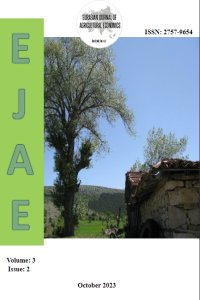Öz
Kaynakça
- Agricultural Data. (2022). Ministry of Agriculture, Excutive Yuan, R.O.C.(Taiwan). [Accessed 11 December 2023], https://eng.coa.gov.tw/ws.php?id=2505378
- Andoko E., Liu W.Y., Zeng H.J. et al. (2022). “Review of Taiwan’s Food Security Strategy”, FFTC-AP. https://ap.fftc.org.tw/article/2570
- Chen, Q.R., (2011). 精緻農業健康卓越方案推動成果.農政與農情,225. https://www.coa.gov.tw/ws.php?id=23055
- Chen, W.X., (2011). 全國糧食安全會議結論.農政與農情,228. https://www.coa.gov.tw/ws.php?id=23714
- Colakoglu S., (2018). Turkey-Taiwan Relations: Opportunities and Limitations. Taiwan Insight. https://taiwaninsight.org/2018/04/05/turkey- taiwan-relations-opportunities-and-limitations/
- Cross-Strait Economic Cooperation Framework Agreement (ECFA). (2009). Mainland Affairs Council, R.O.C. (Taiwan), https://www.mac.gov.tw/en/News_Content.aspx?n=69EE7CEA8C7550BB&sms=D6D0A9E658 098CA2&s=FD1ADAC687DF1AC0
- FAOSTAT. (2023). Food and Agriculture Organization of the United Nations. [Accessed 11 December 2023], https://www.fao.org/faostat/en/#home
- FAO. (2023), “Türkiye earthquakes: initial assessment indicates losses of more than 20 percent in food production”
- Guan, D., Wang, D., Hallegatte, S. et al. (2020). “Global supply-chain effects of COVID-19 control measures.” Nat Hum Behav 4, 577–587. https://doi.org/10.1038/s41562-020-0896-8
- History of Türkiye- EU Relations. (2020). Republic of Türkiye Ministry of Foreign Affairs: [Accessed 11 December 2023], https://www.ab.gov.tr/111_en.html
- IMF. (2023). International Monetary Fund World Economic Outlook. [Accessed 10 September 2023 Investment Guide to Turkey. (2021). Ministry of Finance, R.O.C.
- Kasim K. (2015). Türkiye-Taiwan Relations in the Context of Türkiye’s Asia Pacific Policy. Uluslararası İlişkiler, Volume 12(45), pp. 83-100.
- Kutlu O. (2021). Turkish president calls on foreign investors to make long-term investments. Anadolu Agency.
- Muhammet A. G. (2021). What is Turkey fighting against at home and abroad? Daily Sabah
- Taiwan Agriculture Factsheet. (2022). MOA, R.O.C. https://www.ey.gov.tw/state/CD050F4E400708 4B/0ededcaf-8d80-428e-96b7-7c24feb4ea0d
- Temmuz Y.B.& Selma B. (2020). Turkey’s Turn to the Asia-Pacific. The Diplomat.
- The World Bank. (2022). World Development Indicators. [Accessed 20 December 2023]: http://wdi.worldbank.org/table/4.2
- Trade Statistics. (2022). Ministry of Finance, R.O.C. [Accessed 20 December 2023]: https://web02.mof.gov.tw/njswww/webMain.asp x?sys=100&funid=edefjsptgl
- World Economic Outlook database. (2022). IMF. [Accessed 20 December 2023]: https://www.imf.org/en/Publications/WEO/weo- database/2021/April/weo-report?
- Yeh,C.C., Cheng,.R.H., & Lu.Y.X. (2017). 臺灣與土耳其之間的自由貿易前景:走向更緊密經濟關係新代,經濟前瞻,169, 82-87. https://doi.org/ 10.30071/EOB
Öz
The distinct differences and complementarity between Taiwan and Türkiye offer collaboration opportunities, paving the way for trade and investments to reach mutual benefits in various aspects. This study specifically focuses on agricultural trade, given its direct impact on the daily lives of citizens in both nations and its symbolic role in trade development. This research examines public data from governments and international organizations, along with esteemed publications and credible news reports, to explore the potential for bilateral cooperation, identify existing obstacles, and bolster trade volumes between Taiwan and Türkiye. The findings underscore the significance of domestic political stability, the global business cycle, and diplomatic relations as the key influencers of overall trade volume. Furthermore, diplomatic ties and policies are crucial in shaping agricultural trade. While the total agricultural trade volume between both nations experienced a noteworthy threefold surge from 2012 to 2022, hitting its peak in 2020, the growth trend of agricultural trade doesn't consistently align with overall trade patterns. Numerous challenges hinder trade sustainability and prospects for future cooperation. These obstacles include high transportation expenses due to long-distance and cold chain logistics, limited market exposure, the absence of preferential tariff treatments, and Taiwan's diplomatic dilemma. No formal diplomatic relations essentially increase the difficulty in negotiating bilateral agreements.
The research provides several viable recommendations. For instance, Taiwanese firms might seek direct investment and technology sharing with Türkiye with lower production costs. Correspondently, Türkiye can benefit from technological transfer, stimulating agricultural sector innovation. Additionally, both nations should prioritize trading lightweight, high-value products to overcome the current uneconomic shipment cost while gradually diversifying and increasing trade volume to achieve a scale economy. A significant trade volume could serve as leverage for future preferential tariff negotiations and tighten the relationship between these two countries to fulfill mutual interests in economics and geopolitics.
Anahtar Kelimeler
Taiwan Türkiye Agricultural Trade Future Prospect International Relationship
Kaynakça
- Agricultural Data. (2022). Ministry of Agriculture, Excutive Yuan, R.O.C.(Taiwan). [Accessed 11 December 2023], https://eng.coa.gov.tw/ws.php?id=2505378
- Andoko E., Liu W.Y., Zeng H.J. et al. (2022). “Review of Taiwan’s Food Security Strategy”, FFTC-AP. https://ap.fftc.org.tw/article/2570
- Chen, Q.R., (2011). 精緻農業健康卓越方案推動成果.農政與農情,225. https://www.coa.gov.tw/ws.php?id=23055
- Chen, W.X., (2011). 全國糧食安全會議結論.農政與農情,228. https://www.coa.gov.tw/ws.php?id=23714
- Colakoglu S., (2018). Turkey-Taiwan Relations: Opportunities and Limitations. Taiwan Insight. https://taiwaninsight.org/2018/04/05/turkey- taiwan-relations-opportunities-and-limitations/
- Cross-Strait Economic Cooperation Framework Agreement (ECFA). (2009). Mainland Affairs Council, R.O.C. (Taiwan), https://www.mac.gov.tw/en/News_Content.aspx?n=69EE7CEA8C7550BB&sms=D6D0A9E658 098CA2&s=FD1ADAC687DF1AC0
- FAOSTAT. (2023). Food and Agriculture Organization of the United Nations. [Accessed 11 December 2023], https://www.fao.org/faostat/en/#home
- FAO. (2023), “Türkiye earthquakes: initial assessment indicates losses of more than 20 percent in food production”
- Guan, D., Wang, D., Hallegatte, S. et al. (2020). “Global supply-chain effects of COVID-19 control measures.” Nat Hum Behav 4, 577–587. https://doi.org/10.1038/s41562-020-0896-8
- History of Türkiye- EU Relations. (2020). Republic of Türkiye Ministry of Foreign Affairs: [Accessed 11 December 2023], https://www.ab.gov.tr/111_en.html
- IMF. (2023). International Monetary Fund World Economic Outlook. [Accessed 10 September 2023 Investment Guide to Turkey. (2021). Ministry of Finance, R.O.C.
- Kasim K. (2015). Türkiye-Taiwan Relations in the Context of Türkiye’s Asia Pacific Policy. Uluslararası İlişkiler, Volume 12(45), pp. 83-100.
- Kutlu O. (2021). Turkish president calls on foreign investors to make long-term investments. Anadolu Agency.
- Muhammet A. G. (2021). What is Turkey fighting against at home and abroad? Daily Sabah
- Taiwan Agriculture Factsheet. (2022). MOA, R.O.C. https://www.ey.gov.tw/state/CD050F4E400708 4B/0ededcaf-8d80-428e-96b7-7c24feb4ea0d
- Temmuz Y.B.& Selma B. (2020). Turkey’s Turn to the Asia-Pacific. The Diplomat.
- The World Bank. (2022). World Development Indicators. [Accessed 20 December 2023]: http://wdi.worldbank.org/table/4.2
- Trade Statistics. (2022). Ministry of Finance, R.O.C. [Accessed 20 December 2023]: https://web02.mof.gov.tw/njswww/webMain.asp x?sys=100&funid=edefjsptgl
- World Economic Outlook database. (2022). IMF. [Accessed 20 December 2023]: https://www.imf.org/en/Publications/WEO/weo- database/2021/April/weo-report?
- Yeh,C.C., Cheng,.R.H., & Lu.Y.X. (2017). 臺灣與土耳其之間的自由貿易前景:走向更緊密經濟關係新代,經濟前瞻,169, 82-87. https://doi.org/ 10.30071/EOB
Ayrıntılar
| Birincil Dil | İngilizce |
|---|---|
| Konular | Tarım Ticareti |
| Bölüm | Araştırma Makalesi |
| Yazarlar | |
| Yayımlanma Tarihi | 5 Şubat 2024 |
| Yayımlandığı Sayı | Yıl 2023 Cilt: 3 Sayı: 2 |


